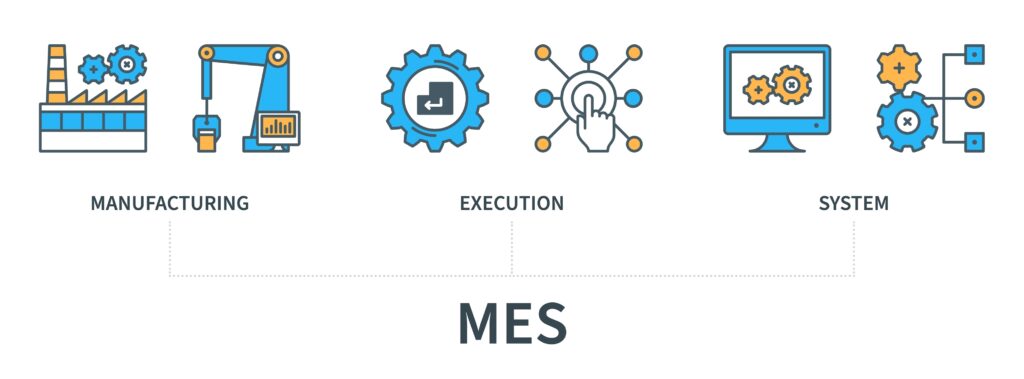What is an MES System?
A Manufacturing Execution System (MES) is a comprehensive, real-time production management system designed to monitor and control the manufacturing process from raw material handling to finished goods. MES integrates multiple production processes, ensures traceability, provides real-time data collection, and supports production planning. In short, MES systems help ensure that manufacturing operations are optimized, consistent, and aligned with both business and production goals.
Core functions of MES systems include:
- Production scheduling
- Quality control
- Equipment maintenance
- Labor management
- Real-time data collection and reporting
Now, let’s explore how SAP fits into this manufacturing landscape.
Related Topic: From Data to Success: Deciphering the Manufacturing Execution Systems (MES)
Understanding SAP’s Role in Manufacturing
SAP is globally recognized as one of the most powerful Enterprise Resource Planning (ERP) systems. It serves businesses across various industries by integrating different functions like finance, supply chain, sales, and human resources into a unified system. When it comes to manufacturing, SAP offers a suite of tools and applications to support shop floor operations, making it a significant player in manufacturing technology.
Key SAP solutions for manufacturing include:
- SAP ERP (Enterprise Resource Planning): This centralizes business functions and manages supply chain activities.
- SAP Manufacturing Integration and Intelligence (SAP MII): Bridges the gap between business systems and the shop floor by offering analytics and integration.
- SAP Digital Manufacturing Cloud (DMC): A cloud-based solution that provides visibility, analytics, and the ability to optimize manufacturing processes.
While SAP offers various tools that can support manufacturing execution, it’s important to note that SAP as a system is not purely an MES.
Related Topic: The Benefits of MES
Is SAP an MES System?
SAP, as a whole, is not an MES system. However, SAP provides a dedicated solution called SAP Manufacturing Execution (SAP ME), which functions as an MES system. SAP ME is designed specifically to help manufacturers optimize production, ensure quality control, and streamline operations on the shop floor. It provides MES capabilities such as real-time data collection, production tracking, and process automation.
SAP ME features include:
- Real-time production monitoring
- Tracking and tracing of production data
- Integration with production equipment for automated data collection
- Product quality checks and defect management
- Performance analysis and reporting tools
In essence, SAP ME serves as SAP’s answer to the growing need for MES functionality within the manufacturing sector. It operates similarly to traditional MES systems but with the advantage of deep integration with the broader SAP ecosystem, including ERP and supply chain management systems.
Related Topic: MES Integration Challenges and Solutions
How SAP ME Enhances Manufacturing Processes?
SAP ME takes MES functionality to the next level by offering a range of features that empower manufacturers to achieve greater efficiency and control. By integrating SAP ME into an existing SAP ecosystem, businesses can gain a holistic view of their operations—from raw materials to finished goods—helping streamline workflows and improve decision-making processes.
Key benefits of SAP ME include:
- Real-Time Production Data: SAP ME provides real-time visibility into production processes, enabling manufacturers to identify bottlenecks and improve production efficiency.
- Seamless Integration with SAP ERP: SAP ME integrates effortlessly with SAP ERP, allowing manufacturers to connect production data with other business processes like inventory management and order fulfillment.
- Enhanced Quality Control: By integrating quality control checks directly into the production process, SAP ME helps ensure that only high-quality products reach the end customer.
- Improved Traceability: SAP ME offers detailed tracking and tracing capabilities, ensuring compliance with industry regulations and enabling rapid responses to recalls or quality issues.
- Scalability: Whether a manufacturer is operating a single plant or managing production across multiple locations, SAP ME offers the scalability needed to support global operations.
Related Topic: MES and Supply Chain Management in Consumer Products
The Relationship Between SAP and MES Systems
While SAP ME offers dedicated MES functionalities, it’s important to understand the broader relationship between SAP solutions and MES systems. Traditionally, MES systems operate between the production floor and business systems, serving as a bridge to ensure that manufacturing operations align with overall business objectives.
In this context, SAP MII (Manufacturing Integration and Intelligence) plays a vital role. It helps integrate the shop floor data collected by SAP ME with higher-level business processes. SAP MII provides analytics and dashboards that give decision-makers a real-time overview of production performance, energy consumption, and other key metrics.
Together, SAP ME and SAP MII create a comprehensive solution that not only manages manufacturing execution but also connects it seamlessly with broader business systems.
Related Topic: The Differences Between MES and ERP Systems for the Food Industry Explained
Comparing SAP ME to Traditional MES Systems
To understand how SAP ME compares to traditional MES systems, it’s helpful to look at the key differences and similarities.
Similarities between SAP ME and traditional MES:
- Both offer real-time production monitoring and control.
- Both support tracking and tracing of production data.
- Both integrate quality control processes into production workflows.
Key differences:
- Integration with ERP systems: While traditional MES systems can integrate with ERP platforms, SAP ME’s native integration with SAP ERP offers a more seamless and efficient connection between shop floor operations and business functions.
- Customization: SAP ME offers extensive customization options, allowing manufacturers to tailor the system to their specific needs.
- Cloud capabilities: With the rise of cloud-based solutions like SAP Digital Manufacturing Cloud, SAP provides a scalable, flexible option that traditional MES systems may not fully support.
Choosing Between SAP ME and Other MES Systems
When deciding between SAP ME and other MES systems, manufacturers should consider several factors, such as:
- Existing Infrastructure: If a business is already using SAP ERP or other SAP solutions, SAP ME may be the logical choice due to its deep integration capabilities.
- Customization Needs: Manufacturers with unique production processes may prefer SAP ME for its extensive customization options.
- Scalability: SAP ME is highly scalable and well-suited for businesses with multi-site operations or those looking to expand.
- Cloud Adoption: If cloud-based solutions are a priority, SAP’s Digital Manufacturing Cloud offers advanced features that may not be available in traditional MES systems.
Final Thoughts:
While SAP isn’t exclusively an MES system, its robust solutions, such as SAP Manufacturing Execution (SAP ME), offer powerful MES capabilities that can optimize manufacturing processes. By integrating SAP ME with other SAP tools, businesses can achieve real-time insights, enhance operational efficiency, and align production activities with strategic business objectives. For companies looking to improve production visibility, quality control, and traceability, SAP ME delivers the comprehensive features needed to stay competitive in today’s fast-paced manufacturing landscape.
For a top-tier provider specializing in SAP solutions, EZSoft Inc. offers expert guidance and implementation services to ensure your manufacturing operations are optimized with the right tools and technologies.
FAQs
What is the main purpose of SAP Manufacturing Execution (SAP ME)?
SAP ME is designed to optimize production processes by providing real-time data, tracking production, and ensuring quality control.
How does SAP ME integrate with SAP ERP?
SAP ME integrates seamlessly with SAP ERP, allowing data to flow between the shop floor and business systems like inventory management and order fulfillment.
Can SAP ME be used in multi-site manufacturing operations?
Yes, SAP ME is scalable and can be deployed across multiple manufacturing sites, making it suitable for global operations.
How does SAP ME enhance traceability in manufacturing?
SAP ME offers detailed tracking and tracing features that allow manufacturers to trace production data back to specific batches, helping with compliance and quality control.
Is SAP ME available as a cloud solution?
Yes, SAP also offers cloud-based manufacturing solutions through SAP Digital Manufacturing Cloud, which provides additional flexibility and scalability.
What industries can benefit from SAP ME?
SAP ME is versatile and can be used in various industries, including automotive, aerospace, electronics, and pharmaceuticals.








